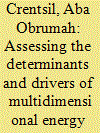| Srl | Item |
| 1 |
ID:
168658


|
|
|
|
|
| Summary/Abstract |
Improving household access and use of clean energy has been central to global development efforts in recent years. The negative effects of energy poverty on health, climate, livelihoods and economy has led to increased investments towards achieving universal access to clean energy. However, significant deprivations in clean energy remains, especially in developing countries. Energy poverty may involve simultaneous deprivations on availability and affordability of clean energy. Using repeated cross-sectional data, this paper assesses the extent and determinants of multidimensional energy poverty in Ghana between 2008 and 2014. The paper finds that though the level of multidimensional energy poverty reduced in Ghana between 2008 and 2014, the incidence and intensity of multidimensional energy poverty remains high. Further, we find substantial subgroup differences in multidimensional energy poverty. The results reveal significant relationships between household characteristics and the multidimensional energy poverty status of households. The reductions in multidimensional energy poverty were driven by the coefficient effects attributable to structural and policy changes over the period. To facilitate universal access to clean energy and reduce the degree of multidimensional energy poverty, there is the need to intensify the LPG promotion campaign and adopt strategies that target left-behind and underserved groups.
|
|
|
|
|
|
|
|
|
|
|
|
|
|
|
|
| 2 |
ID:
179691


|
|
|
|
|
| Summary/Abstract |
This paper aims to measure multidimensional energy poverty at the household level and study its impacts on health status. Based on Chinese General Social Survey (CGSS) data, we evaluated multidimensional energy poverty at the household level using the entropy method. We then examined the effects of energy poverty on health status from both physical and psychological perspectives. The empirical results indicate that multidimensional energy poverty harms both physical and mental health. We further conducted regional and urban–rural comparative analyses. The findings demonstrate that the health of residents in less developed provinces is more severely affected, and multidimensional energy poverty deteriorates the physical health of rural residents but impacts the mental health of urban residents. For developing countries like China, the first priority should be multidimensional energy poverty reduction through modern energy infrastructure system construction and subsidies for energy poor households, and improving the medical security system should be considered as next step. There is also an urgent need of policy measures focusing on mitigating regional and urban–rural disparities at the same time.
|
|
|
|
|
|
|
|
|
|
|
|
|
|
|
|
| 3 |
ID:
188549


|
|
|
|
|
| Summary/Abstract |
The current study aims to investigate the most pivotal social predicament of energy poverty in multiple attributes between farming and non-farming communities of agro-climatic zones of Pakistan. To highlight outcomes empirically, unanimously accredited Alkire and Foster's (2008) indexing methodology and well-organized cross-sectional data of PSLM of the last decade have been used. An assessment of the study reveals that multidimensional energy poverty is purely a farming phenomenon for agro-climatic zones of Pakistan. However, the time-variant situation evaluates that in the smaller (longer) frame of time, energy poverty presents a hybrid (increasing) trend between both discussed communities and across all the agro-climatic zones except cotton-wheat Sindh. Moreover, a relative change in energy poverty shows that in non-farming communities, the declining rate of energy poverty has been immensely satisfying for the last decade. Sustainable Development Goal of complete energy poverty reduction under similar circumstances can easily be achieved by 2030, while contrarily in farming communities, still quicker development in most of the energy services, like provision of gas and electricity, access to most of the households at their doorsteps on inexpensive rate, and creating awareness to the use of modern energy gadgets are required to achieve SDG in given in due time.
|
|
|
|
|
|
|
|
|
|
|
|
|
|
|
|